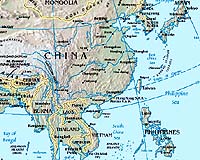 |
Beijing (AFP) Nov 6, 2009 As Chinese firms pour billions of dollars into mining, energy and infrastructure deals in Africa, Beijing is turning a blind eye to rogue regimes that stand to reap the benefits, observers say. Guinea's military rulers are the latest on the continent to receive a pledge of a massive infusion of Chinese cash -- at least seven billion dollars over five years in the mining sector from China Investment Fund (CIF). With Chinese Premier Wen Jiabao heading to Egypt for a summit with African leaders this weekend, observers say his government should be held more accountable for opaque investments made by firms with possible state links. Kissy Agyeman-Togobo, at IHS Global Insight, said the deal "could provide Guinea's junta with financial independence from traditional Western donors in the wake of security force brutalities... in which over 150 people died". It "once again throws up the question of China's oft-criticised approach of dealing with dubious regimes, particularly at this sensitive time when Guinea's relationship with the international community hangs in the balance". In September, troops opened fire at a public rally in Conakry held in protest against junta leader captain Moussa Dadis Camara ahead of presidential elections planned for January. The regime says 56 people were killed. From oil in Sudan, Angola and Nigeria to bauxite in Guinea, China has been pouring money into natural resources not only in Africa but also around the globe, with other investments in Peruvian iron and Mongolian copper. Over the past five years, Chinese direct investment in Africa has soared, from 491 million dollars in 2003 to 7.8 billion dollars in 2008, according to official Chinese figures. The investment spree is designed to gain access to resources to fuel China's hectic economic growth. Beijing says investments like the CIF one -- announced less than two weeks after the bloodshed in Conakry -- are strictly private. But a recent report by the US-China Economic and Security Review Commission, a panel of experts chosen by Congress, suggested that Hong Kong-based CIF was in fact part of a nebulous group of companies with links to the state. "There is evidence that several of its key personnel have ties to Chinese state-owned enterprises and government agencies... and possibly China's intelligence apparatus," the commission said. But Syetarn Hansakul, a Singapore-based analyst for Deutsche Bank, said she was not convinced that the ruling Communist party was pulling strings on deals made abroad by Chinese firms. "The government explicitly said, 'We need to build up energy resources and reserves'," Hansakul told AFP. "When they receive a broad mandate like that... naturally companies think 'We need to secure (resources)'. But they choose the countries where they invest. "There is no agenda (...) to support any government or group," said Hansakul. "It is commercially-driven, it is business-dealing, sometimes with consequences." Barry Sautman, an associate professor of social science at the Hong Kong University of Science and Technology, said China did not deserve to be singled out for investments made with controversial regimes. In Sudan, "China is certainly not alone in developing the oil industry", Sautman said, noting that it was linked to projects in which India's ONGC and Malaysia's Petronas, both state-owned firms, held major stakes. Both firms, in addition to China's PetroChina and Sinopec, have been accused by US non-profit organisation Investors Against Genocide of "helping to fund the genocide in Darfur" in western Sudan. Share This Article With Planet Earth
Related Links
 ADB: Asia-Pacific energy needs trillions
ADB: Asia-Pacific energy needs trillionsTokyo (UPI) Nov 5, 2009 The Asia-Pacific region needs to invest between $7 trillion and $9.7 trillion in the energy sector between 2005 and 2030 to meet the rapidly growing demand for energy, according to a report by the Asian Development Bank. Regional energy demand is projected to grow 2.4 percent annually over the next 20 years, outpacing the world average of 1.5 percent, states the ADB report, "Energy Outl ... read more |
|
| The content herein, unless otherwise known to be public domain, are Copyright 1995-2009 - SpaceDaily. AFP and UPI Wire Stories are copyright Agence France-Presse and United Press International. ESA Portal Reports are copyright European Space Agency. All NASA sourced material is public domain. Additional copyrights may apply in whole or part to other bona fide parties. Advertising does not imply endorsement,agreement or approval of any opinions, statements or information provided by SpaceDaily on any Web page published or hosted by SpaceDaily. Privacy Statement |